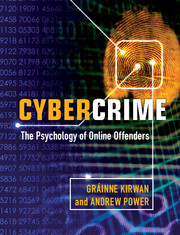Cybercrime: The psychology of online offenders
Kirwan
Availability:
Available - shipped within 2 business days after the order
Available - shipped within 2 business days after the order
Publisher:
Cambridge University Press
Cambridge University Press
Publication Year:
2013
2013
ISBN-13:
9780521180214
ISBN-10: 052118021X
ISBN-10: 052118021X
Description:
Cybercrime is a growing problem in the modern world. Despite the many advantages of computers, they have spawned a number of crimes, such as hacking and virus writing, and made other crimes more prevalent and easier to commit, including music piracy, identity theft and child sex offences. Understanding the psychology behind these crimes helps to determine what motivates and characterises offenders and how such crimes can be prevented. This textbook on the psychology of the cybercriminal is the first written for undergraduate and postgraduate students of psychology, criminology, law, forensic science and computer science. It requires no specific background knowledge and covers legal issues, offenders, effects on victims, punishment and preventative measures for a wide range of cybercrimes. Introductory chapters on forensic psychology and the legal issues of cybercrime ease students into the subject, and many pedagogical features in the book and online provide support for the student.
No specific background knowledge of law or psychology is required, ensuring this textbook is accessible to undergraduate students of psychology, criminology, law, forensic science and computer science
Criminological and forensic psychological theories are outlined to help students gain a better understanding of how theoretical models and concepts can be used to explain cybercriminal behaviour
Covers both high profile cybercrimes (cyberterrorism, online child sex offences) as well as lower profile cybercrimes (online fraud, copyright infringement)
Examines policy and the psychology of cybercriminal offenders but also the effects on victims, highlighting the wide variety of individuals who are affected by cybercrime
No specific background knowledge of law or psychology is required, ensuring this textbook is accessible to undergraduate students of psychology, criminology, law, forensic science and computer science
Criminological and forensic psychological theories are outlined to help students gain a better understanding of how theoretical models and concepts can be used to explain cybercriminal behaviour
Covers both high profile cybercrimes (cyberterrorism, online child sex offences) as well as lower profile cybercrimes (online fraud, copyright infringement)
Examines policy and the psychology of cybercriminal offenders but also the effects on victims, highlighting the wide variety of individuals who are affected by cybercrime


